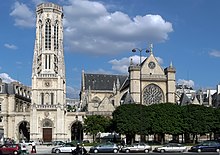Saint-Germain l'Auxerrois
| Saint-Germain l'Auxerrois | |
|---|---|

Saint-Germain l'Auxerrois
|
|
| Basic information | |
| Location | 2 Place du Louvre, 1e |
| Geographic coordinates | 48°51′34″N 2°20′26″E / 48.85944°N 2.34056°ECoordinates: 48°51′34″N 2°20′26″E / 48.85944°N 2.34056°E |
| Affiliation | Catholic Church |
| Rite | Roman Rite |
| State | France |
| Province | Archdiocese of Paris |
| Region | Île-de-France |
| Status | Active |
| Heritage designation | 1862 |
| Website | www |
| Architectural description | |
| Architectural type | Church |
| Architectural style | French Gothic |
| Groundbreaking | 12th century |
| Completed | 15th century |
| Direction of façade | West |
The Church of Saint-Germain-l'Auxerrois is situated at 2 Place du Louvre, Paris 75001; the nearest Métro station is Louvre-Rivoli. Alexandre Boëly was organist at this church from 1840 to 1851.
Founded in the 7th century, the church was rebuilt many times over several centuries. It now has construction in Roman, Gothic and Renaissance styles. The most striking exterior feature is the porch, with a rose window and a balustrade above which encircles the whole church, a work of Jean Gaussel (1435–39). Among the treasures preserved inside are a 15th-century wooden statue of Saint Germain, a stone carved statue of Saint-Vincent a stone sculpture of Isabelle of France (saint), a Flemish altarpiece carved out of wood, the famous "churchwarden's pew" where important people sat, made in 1683 by François, Le Mercier from drawings by Charles Le Brun.
During the Wars of Religion, its bell called "Marie" sounded on the night of 23 August 1572, marking the beginning of the St. Bartholomew's Day Massacre. Thousands of Huguenots, who visited the city for a royal wedding, were killed by the mob of Paris. A splendid stained glass still remains, in spite of plunderings during the French Revolution. The north tower was added in 1860 and stands opposite the Mairie of the 1st Arrondissement (1859).
...
Wikipedia
